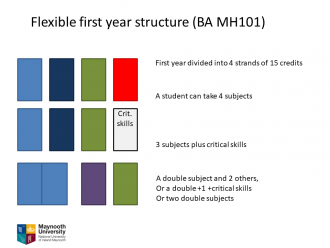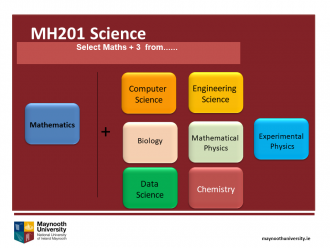The structure of our BA programme allow students to decide whether to specialise from the start, or to take up to four subjects in the first year and focus later. Students study 60 credits each academic year, you can decide how to divide up these credits across your subjects in year 1.
Subject Choice on the MH101 Arts Programme
Students on the MH101 Arts Programme can choose from 38 subjects across six timetable groups: you can view the timetable groups in Coursefinder.
You can choose four, three or two subjects - you can choose a maximum of one subject in each group (you cannot take two subjects from the same group).
Some subjects may be taken as a double subject (i.e. 30 credits) in 1st year. If you plan on studying beginner level German and Spanish you will take 30 credits in 1st year as you will take extra language modules. Mathematics (Pure) also requires 30 credits in 1st year (groups 1 and 3).
An extra timetabled group of subjects exists (not one of groups 1-6) for the optional extra 15 credits that are available in Anthropology, Computer Science, German (beginners), History, International Development, Law and Spanish (beginners).
Critical Skills is available in all groups for MH101.
Student Registration Guide
The Registrar's Office has produced a First Year Registration Guide designed to explain the options within your chosen programme and which will help you make the right choices for you, this Guide is available to download from the Student Records & Registration Office website.
Frequently Asked Questions
- I am a first year Arts student. How many subjects can I study in second year?
As an Arts student you can progress into second year with either 2 subjects (on either a Double Major or Major with a Minor pathway), or 1 subject (a Single Major pathway) when available, not all subjects are available a Single major.
- What will my pathway options be as a second year Arts student?
Each year you will study 60 credits, like this year. You have a choice of how you want to use your credits for second and third year - this is called your pathway. There are a number of pathways available for students in second year of the Arts program
Single Major: 60 credits in one subject (there is only a limited number of subjects that are available a Single Major)
Double Major: 30 credits in two subjects.
Major with a Minor: 40 credits in one subject and 20 credits in the other subject.
- Where can I find out what pathways are available in my subjects for next year?
You can either look up second year of your programme in Coursefinder or you can look the Second Year Progression Options for each of your subjects in the First Year Registration Guide (linked above).
- How many credits make up a “Double” in a subject in first year?
A double subject is made up of 30 credits. 22.5 credits in a subject does not amount to a “double”. In general, students who are register for 22.5 credits in a subject have the same progression options as a student who studies 15 credits of a subject. The exception to this rule is Accounting
- I want to transfer into second year of a different programme next year. How do I do this?
First year Arts students, you will find the second year transfer options available by subject in your First Year Registration Guide. If you meet the transfer eligibility requirements listed in the Registration Guide, you will have the option to register for second year of the different programme(s) when you log in to StudentWeb to register for second year. You do not need to apply for these transfers options.
In the Bachelor of Science degree, you take four subjects in your first year, one of which is Mathematics.
Students taking Engineering Science must also take Computer Science. Engineering Science cannot be combined with Biology. Data Science cannot be combined with Mathematical Physics.
After second year you can choose progress in either a Double Major (taking two subjects equally to degree level), or a Single Major, where you take two subjects in third year and after that, specialise in one subject.
Frequently Asked Questions
- I am a first year Science student. How many subjects will study in second year?
As a Science student you will progress three of your first year subjects into second year. There is one exception to this rule: students can register for the Double Major in Mathematical Physics and Mathematics (Pure), if they meet the grade requirements.
- Is Mathematics a compulsory subject in second year?
Mathematics is not a compulsory subject in second year of the BSc. The exception to this rule is students studying Computer Science and/or Data Science.
- Is it possible to transfer into second year of the Electronic Engineering programme from the BSc Science?
Students who get 50% or more in Engineering Science, Computer Science and Mathematics in first year Science are eligible to transfer into second year of Electronic Engineering: . They must achieve at least 50% in each subject on the first sitting.
Programme Choice:
I want to transfer into second year of a different programme next year. How do I do this?
Many students plan to transfer out of a general degree into a specialised degree at the beginning of year 2. The automatic transfer options for students on the MH101 programme are listed in the First Year Guide you received at registration last year.
For all other internal transfer options please read the information on the Curriculum Office website.
I want to repeat first year on a different programme. What do I need to do?
To start a new programme from first year, you will need to reapply through the CAO. Be sure to check that you meet the entry requirements for the programme reapplying. You can discuss a programme's entry requirements with the Admissions Office.
Where can I find information about Electives next year?
We have a dedicated information page for our Electives that includes information on embed Electives into your second year, the benefits of taking an Elective and Elective FAQs: www.maynoothuniversity.ie/electives
Teaching as a Career:
Is it compulsory to study Irish if I want to become a primary school teacher?
No. Irish as a subject at University is not necessary for the PME Primary. Students are asked to attain the TEG B1 level. The TEG is available as an Elective in second year.
I want to become a secondary school teacher, can I still register for an Elective?
It is important that you check the Teaching Council Requirements for the subject that you wish to teach, which are available on the Teaching Council website. Generally, students are still eligible to take an Elective in second year.
What modules do I need to study to become a secondary school teacher in my subjects?
The Teaching Council of Ireland set the subject requirements for teaching at post-primary level. You can find these requirements on their website. Please note that these are the current requirements for qualified teachers wishing to register with the Teaching Council, you may want to consult the website again before choosing your third year modules.
The Critical Skills courses are designed to help first year students to learn, experience, practice and develop various essential skills that will support their learning. At third level it is expected that students will develop skills that will enable them to successfully negotiate their university experience. These critical skills include:
- Analytical thinking,
- Evaluating evidence
- Making balanced judgments
- Communicating ideas clearly.
The Critical Skills subject aims to develop these skills early in the University experience. Discover more information about the Maynooth University Critical Skills courses on the Critical Skills webpage: www.maynoothuniversity.ie/critical-skills
You may come across some new terminology during your first few weeks at University, we have explained some of the most common University terms below:
Programme: a course of study leading to an award of the University. Most new students will study a degree programme with us but we also have students studying on Certs, Diplomas, Postgraduate programmes such as Masters and PhDs.
Subject: the subjects you will study as part of your degree. Some programme are single subject programmes such as Electronic Engineering and Business, while most programmes require students to study two or more subjects.
Module: a subcomponent of a subject. A module covers a specific topic(s) within a subject. Most first year students will study 4 modules per semester. Most of our first year modules are worth 7.5 credits.
Credit: students register for 60 credits each year. A typical first year module is worth 7.5 credits. To pass first year, you must earn the credit of each of your modules by passing them, when you earn all 60 credits you can progress into second year.
Compulsory Module: a module that everyone registered for that programme/subject must take. Students must register for compulsory modules within a subject/programme, it is obligatory.
Required Module: students must pass a required module with a result of 40% or more. A required module cannot be passed by compensation i.e. with a grade of 35-39%. Required modules are common in the language subjects.
Semester: each year of study is divided into two study periods known as semesters. Semester 1 lectures usually begins around the third week of September and finishs before Christmas. Semester 1 exams take place in January. Semester 2 usually begins around the first week of February and finishes in early May. Semester 2 exams begin around mid-May.
Lecture: a teaching and learning session given generally by a lecturer to a large number of students at once.
Tutorial: a meeting with a member of the academic subject team with smaller groups of students. The main aim of a tutorial is discussion and interaction among the students attending. You must sign up seperately for tutorials (you won't automatically be assigned a tutorial time) usually through Moodle. Attendance is usually required and graded.
Lab: a lab is typically a compulsory 2-3 hour session where students attempt experiments/exercises as directed by the lab demonstrators. The aim of the lab is to provide students with practical experience of the material that you learn about in lectures.
Continuous Assessment: continuous assessment is a way of evaluating a student's progress in a module throughout the course of the semester. Continuous Assessment may include essays, lab reports, inclass tests, presentations, e-portfolios. Students may be examined on what they have learned in a module by an exam at the end of the semester or through continous assessment or a combination of both.


